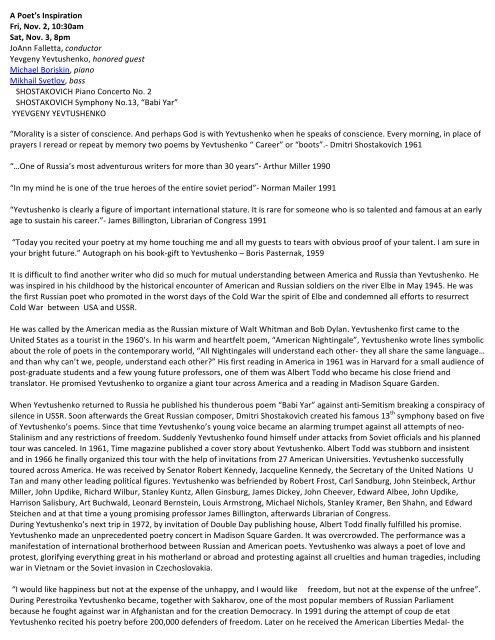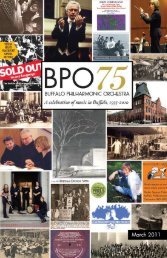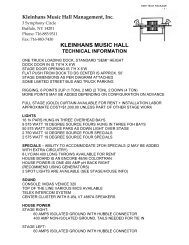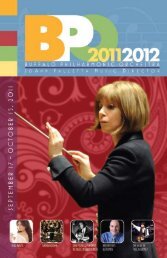Classics 2012-2013 Biographies - The Buffalo Philharmonic Orchestra
Classics 2012-2013 Biographies - The Buffalo Philharmonic Orchestra
Classics 2012-2013 Biographies - The Buffalo Philharmonic Orchestra
Create successful ePaper yourself
Turn your PDF publications into a flip-book with our unique Google optimized e-Paper software.
A Poet’s Inspiration<br />
Fri, Nov. 2, 10:30am<br />
Sat, Nov. 3, 8pm<br />
JoAnn Falletta, conductor<br />
Yevgeny Yevtushenko, honored guest<br />
Michael Boriskin, piano<br />
Mikhail Svetlov, bass<br />
SHOSTAKOVICH Piano Concerto No. 2<br />
SHOSTAKOVICH Symphony No.13, “Babi Yar”<br />
YYEVGENY YEVTUSHENKO<br />
“Morality is a sister of conscience. And perhaps God is with Yevtushenko when he speaks of conscience. Every morning, in place of<br />
prayers I reread or repeat by memory two poems by Yevtushenko “ Career” or “boots”.-‐ Dmitri Shostakovich 1961<br />
“…One of Russia’s most adventurous writers for more than 30 years”-‐ Arthur Miller 1990<br />
“In my mind he is one of the true heroes of the entire soviet period”-‐ Norman Mailer 1991<br />
“Yevtushenko is clearly a figure of important international stature. It is rare for someone who is so talented and famous at an early<br />
age to sustain his career.”-‐ James Billington, Librarian of Congress 1991<br />
“Today you recited your poetry at my home touching me and all my guests to tears with obvious proof of your talent. I am sure in<br />
your bright future.” Autograph on his book-‐gift to Yevtushenko – Boris Pasternak, 1959<br />
It is difficult to find another writer who did so much for mutual understanding between America and Russia than Yevtushenko. He<br />
was inspired in his childhood by the historical encounter of American and Russian soldiers on the river Elbe in May 1945. He was<br />
the first Russian poet who promoted in the worst days of the Cold War the spirit of Elbe and condemned all efforts to resurrect<br />
Cold War between USA and USSR.<br />
He was called by the American media as the Russian mixture of Walt Whitman and Bob Dylan. Yevtushenko first came to the<br />
United States as a tourist in the 1960’s. In his warm and heartfelt poem, “American Nightingale”, Yevtushenko wrote lines symbolic<br />
about the role of poets in the contemporary world, “All Nightingales will understand each other-‐ they all share the same language…<br />
and than why can’t we, people, understand each other?” His first reading in America in 1961 was in Harvard for a small audience of<br />
post-‐graduate students and a few young future professors, one of them was Albert Todd who became his close friend and<br />
translator. He promised Yevtushenko to organize a giant tour across America and a reading in Madison Square Garden.<br />
When Yevtushenko returned to Russia he published his thunderous poem “Babi Yar” against anti-‐Semitism breaking a conspiracy of<br />
silence in USSR. Soon afterwards the Great Russian composer, Dmitri Shostakovich created his famous 13 th symphony based on five<br />
of Yevtushenko’s poems. Since that time Yevtushenko’s young voice became an alarming trumpet against all attempts of neo-‐<br />
Stalinism and any restrictions of freedom. Suddenly Yevtushenko found himself under attacks from Soviet officials and his planned<br />
tour was canceled. In 1961, Time magazine published a cover story about Yevtushenko. Albert Todd was stubborn and insistent<br />
and in 1966 he finally organized this tour with the help of invitations from 27 American Universities. Yevtushenko successfully<br />
toured across America. He was received by Senator Robert Kennedy, Jacqueline Kennedy, the Secretary of the United Nations U<br />
Tan and many other leading political figures. Yevtushenko was befriended by Robert Frost, Carl Sandburg, John Steinbeck, Arthur<br />
Miller, John Updike, Richard Wilbur, Stanley Kuntz, Allen Ginsburg, James Dickey, John Cheever, Edward Albee, John Updike,<br />
Harrison Salisbury, Art Buchwald, Leonard Bernstein, Louis Armstrong, Michael Nichols, Stanley Kramer, Ben Shahn, and Edward<br />
Steichen and at that time a young promising professor James Billington, afterwards Librarian of Congress.<br />
During Yevtushenko’s next trip in 1972, by invitation of Double Day publishing house, Albert Todd finally fulfilled his promise.<br />
Yevtushenko made an unprecedented poetry concert in Madison Square Garden. It was overcrowded. <strong>The</strong> performance was a<br />
manifestation of international brotherhood between Russian and American poets. Yevtushenko was always a poet of love and<br />
protest, glorifying everything great in his motherland or abroad and protesting against all cruelties and human tragedies, including<br />
war in Vietnam or the Soviet invasion in Czechoslovakia.<br />
“I would like happiness but not at the expense of the unhappy, and I would like freedom, but not at the expense of the unfree”.<br />
During Perestroika Yevtushenko became, together with Sakharov, one of the most popular members of Russian Parliament<br />
because he fought against war in Afghanistan and for the creation Democracy. In 1991 during the attempt of coup de etat<br />
Yevtushenko recited his poetry before 200,000 defenders of freedom. Later on he received the American Liberties Medal-‐ the






